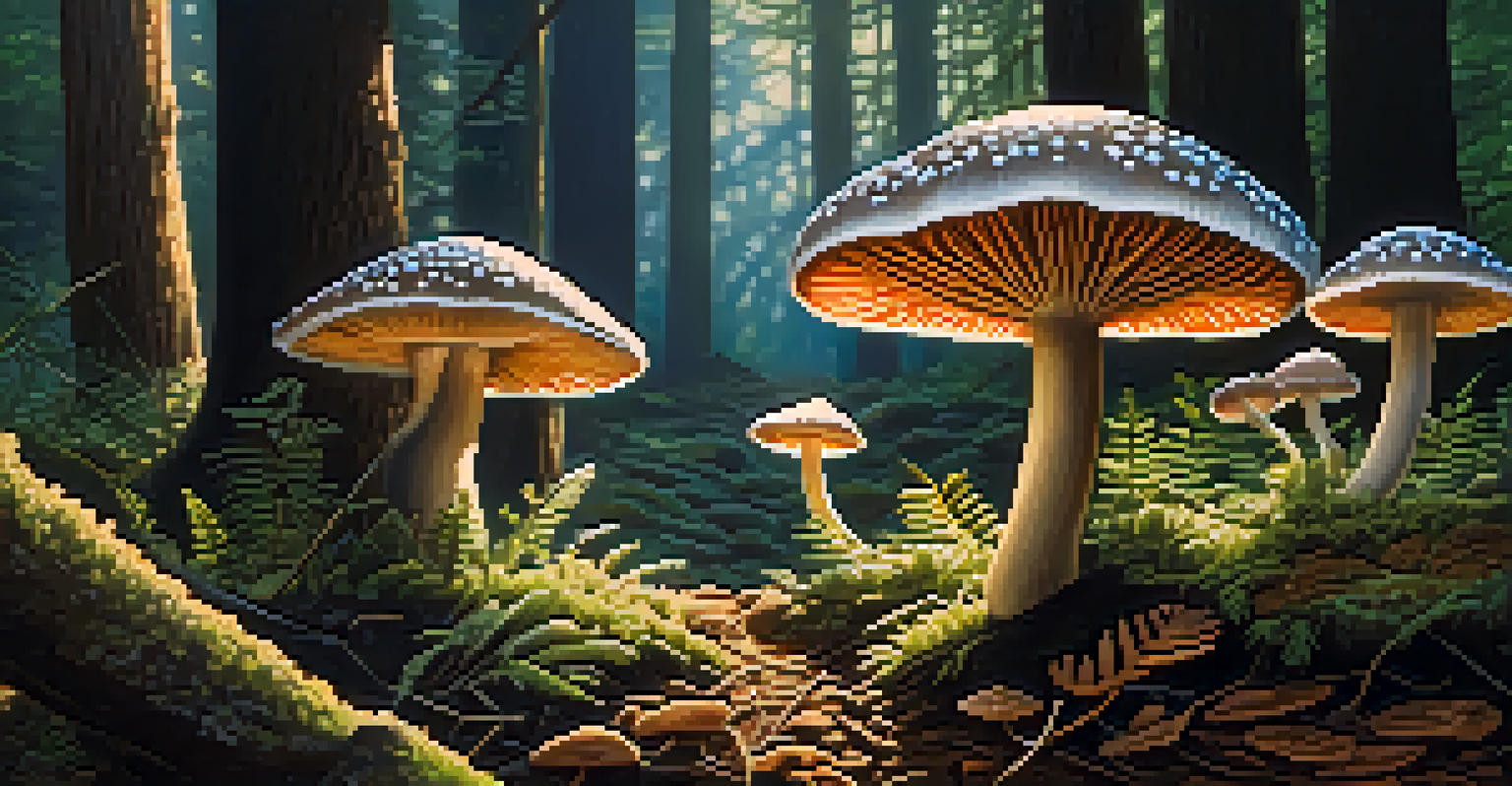Philosophical Perspectives on Entheogens and Consciousness

Understanding Entheogens: A Brief Overview
Entheogens are substances that are often used in spiritual or religious contexts to induce altered states of consciousness. These can range from natural plants like psilocybin mushrooms to synthetic compounds like LSD. The philosophical implications of these experiences are profound, as they challenge the boundaries of what we consider reality and consciousness.
The greatest discovery of my generation is that a human being can alter his life by altering his attitude of mind.
Historically, many cultures have utilized entheogens in rituals, believing they provide insights into the divine or the self. This practice highlights a deep-rooted connection between these substances and human spirituality. By exploring this connection, we can better understand how altered states might provide new perspectives on life and existence.
As society becomes more receptive to the therapeutic use of these substances, it raises questions about their role in personal and collective consciousness. Are these experiences merely neurochemical reactions, or do they hold deeper meanings? This inquiry invites us to explore the intersection of philosophy, psychology, and spirituality.
Philosophical Traditions: Views on Consciousness
Philosophy has long grappled with the nature of consciousness, asking questions about its origins, purpose, and dimensions. Key philosophical traditions, such as dualism and materialism, offer different lenses through which we can examine consciousness. Dualists argue that consciousness exists separately from the physical body, while materialists view it as a product of brain activity.

Entheogens complicate these traditional views, as they can induce experiences that feel profoundly spiritual or transcendent. Many who have used these substances report feelings of unity with the universe, challenging the notion of separateness promoted by materialism. This raises the question: could entheogens provide access to a higher form of consciousness?
Entheogens Enhance Spiritual Insights
Entheogens induce altered states of consciousness that can lead to profound spiritual experiences and insights.
By considering consciousness through the lens of entheogenic experiences, we may find new insights that bridge philosophical divides. This dialogue can enrich our understanding of not only what it means to be conscious but also how we relate to one another and the world around us.
The Experiential Aspect: What Users Report
Users of entheogens often describe their experiences as deeply transformative, frequently reporting a shift in perspective about life and existence. This subjective experience is vital for understanding the philosophical implications of these substances. It opens up discussions about the nature of reality and our place within it.
We are all interconnected; we are all one, and we are all part of the same universe.
Many report feelings of interconnectedness, where the boundaries between self and other dissolve. This experience can lead to profound insights about empathy, love, and our shared human experience. Such shifts can challenge the individualistic worldview that dominates modern society, suggesting a more collective approach to consciousness.
These experiences can also raise questions about the validity of subjective experiences in philosophical discourse. If consciousness can be altered to such a degree, how do we assess the nature of reality and truth? This conundrum invites deeper reflection on the ways we interpret and value personal experiences in our understanding of consciousness.
Entheogens and Mystical Experiences
Mystical experiences induced by entheogens are often characterized by feelings of unity, transcendence, and ineffability. Philosophers like William James have explored these experiences, suggesting they provide a glimpse into a deeper reality. This idea aligns with many spiritual traditions that view such states as essential to understanding the divine.
The philosophical significance of these experiences raises questions about the nature of truth. If individuals can experience what they perceive as a direct connection to a higher power or universal consciousness, how do we reconcile this with empirical knowledge? This tension between subjective experience and objective reality is a key area of exploration.
Philosophy Meets Consciousness
The use of entheogens raises important philosophical questions about the nature of consciousness and reality.
Furthermore, these mystical experiences can foster a sense of purpose and connection to the universe. Many users report lasting changes in their worldview, leading to more compassionate and environmentally-conscious lifestyles. This highlights how entheogens may not only reveal deeper philosophical truths but also encourage positive social change.
Ethics of Entheogen Use: A Philosophical Inquiry
The use of entheogens raises a host of ethical questions, particularly regarding consent, safety, and cultural appropriation. As these substances gain popularity in Western society, it is crucial to consider the ethical implications of their use. For instance, how do we respect the indigenous cultures that have used these substances for centuries?
Moreover, the therapeutic potential of entheogens in treating mental health issues presents ethical dilemmas related to accessibility and regulation. If these substances can significantly improve well-being, who gets access to them? The conversation around ethics encourages a broader understanding of responsibility in the context of both personal and societal use.
We must also consider the potential for misuse and the societal implications of normalizing entheogen use. A thoughtful philosophical inquiry into these ethical dimensions can help us navigate this complex landscape, ensuring that we honor both the history of these substances and the experiences they cultivate.
Scientific Perspectives: Bridging Science and Philosophy
Recent scientific research into entheogens has begun to reveal how these substances affect brain function and consciousness. Studies show that they can lead to increased connectivity between different brain regions, creating experiences that feel profoundly insightful or spiritual. This scientific perspective provides a valuable complement to philosophical inquiries.
However, the challenge lies in interpreting these findings within a broader philosophical context. Does a biological explanation for mystical experiences diminish their significance, or does it enhance our understanding of consciousness? This ongoing dialogue between science and philosophy is crucial in unpacking the complexities of human experience.
Ethical Considerations in Use
The growing popularity of entheogens for therapeutic use prompts ethical discussions about consent, cultural respect, and accessibility.
Ultimately, bridging these fields can lead to a more comprehensive understanding of consciousness. By synthesizing scientific findings with philosophical reflections, we can explore how entheogens may unlock new dimensions of awareness, enriching our collective quest for knowledge about the mind and spirit.
Future Directions: Entheogens and Consciousness Studies
As our understanding of entheogens evolves, so too does the potential for new philosophical inquiries into consciousness. The growing interest in psychedelics for therapeutic use opens the door for deeper exploration of their implications for mental health and spirituality. This intersection of disciplines can lead to innovative approaches to understanding the mind.
Future research might focus on the long-term impacts of entheogen use on consciousness and well-being. How do these experiences resonate with individuals years after the fact? Such investigations can illuminate the lasting effects of altered states and their role in shaping personal identity and worldview.

Moreover, the ongoing dialogue between philosophy, psychology, and neuroscience can foster a richer understanding of consciousness. By embracing diverse perspectives, we can continue to unravel the mysteries of the mind, paving the way for future explorations of what it means to be conscious in an ever-evolving world.